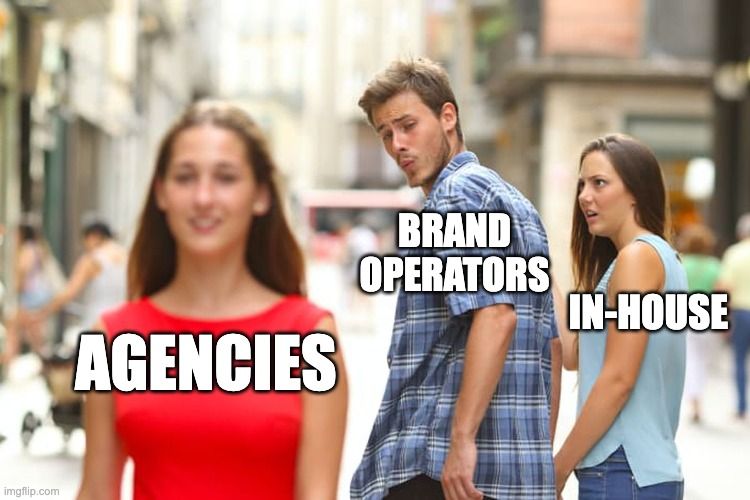Okay, so you have a PPC team and you have an SEO team. Both are invested in ensuring their channel is successful, but how do you get them to work together? In this article we'll look at some tactics for using SEO and SEM to help one another.
First, let's start in the philosophical, but no-less important, realm. Seriously, this is crucial and don't skip over it.
Partnering or hiring well for these two channels is crucial. You can't get PPC and SEO to work together, if you have hired agencies or employees who solely care about demonstrating single channel success. In PPC, that can often look like the team pushing harder for bottom of funnel traffic like brand terms and remarketing audiences rather than being concerned with top-line growth. This isn't helped, by the way, with aggressive, immovable single channel goals given to them by the client.
Rather, hiring someone who genuinely wants to investigate the big picture strategy required to target the right single channel goals, that allows for topline growth over time is the first step. They will be more collaborative simply because the right team/person has the same objective you have: growing your actual brand, not simply their channel reported revenue.
That being said, how does one actually see SEO and SEM working together in a brand?
The ZATO team came up with a few ways, and I'll share them here. There are many others, but hopefully this gives you a good foundation to begin with.
Six Ways to Use PPC and SEO To Help One Another
(1) link Google Search Console and Ads.
This may seem like another throwaway point, but you would be surprised how many accounts we take over (I'm guessing +75%) that don't have this initial step done. You can do so easily in the Tools & Settings > Linked Accounts side of your Google Ads account (you will need someone with admin access to do this).

(2) Analyze your Paid & Organic Report

Now that this is out of the way, you can then utilize this data over time to identify the relationship between your paid and organic listings in the same SERPs. This can be found in the "Predefined Reports" in the Google Ads UI.
With this report, there are a number of ways you can analyze the data and turn it into actionable data.
You may for instance filter for queries in which only your ad is showing, but that are high in CTR which shows strong engagement.

These could be great terms to send to your SEO team to identify ways you can build out new landing pages. For instance, you may find some "how to" like terms on this page, and these are often ignored by PPCers, but they can be fantastic pages for your SEO team to build out to build free traffic in the upper part of the funnel of your audience.
By the way, the flip side is also true. You can filter for the Organic only queries to identify whether there are opportunities for ads. I'd caution you to investigate the top queries in question, but if there is high competition on those terms, then the incremental value you receive from adding the ads to those particular SERPs may do more to steal from your competitors above your organic slot. You'd want to avoid this route if you control the organic SERPs with no ad placements for those queries... why pay for clicks you don't need to. As always, test, research, and analyze before implementation.
(3) Be strategic based on your needs
It's important to match your current business goals and reality into the strategy here. If you are a new business just starting up, you likely need to invest in both SEO and PPC, but may want to use PPC to more quickly gather data and build your customer base while SEO takes the time it needs. In that regard, I would warn you to avoid pushing too much of your budget to PPC simply because of the quick return. A solid SEO strategy will give you far more bang for your buck over time.
That being said, you will see certain PPC terms that are simply priced outside of your abilities, especially as a new advertiser. These can be terms you send to your SEO team... terms that convert well, but that you simply cannot keep efficient because of their high auction costs. A list of these keywords sent to the SEO team, who can then investigate to identify organic competitiveness will prove to be valuable as you can then focus your energy in PPC on more affordable terms, while the SEO energy is focused on terms you know to be conversion-friendly, but priced out of your PPC abilities.
By the way, if the SEO team focuses on these terms in building out landing pages and content around them, you may actually see your CPCs lower because your Quality Score will improve.
(4) Wait, SEO can Impact PPC Keyword Quality Score?!
Well, kind of.
It's important to distinguish here between direct and indirect impact.
SEO doesn't impact PPC Quality Score directly, at all. Like, it doesn't.
That being said, SEO *can* impact PPC indirectly when landing pages are improved to make keywords, ads, and landing pages more relevant to one another. In this case, working with your SEO team to create great content for key queries people search for in PPC can benefit both teams.
A final note on this, it's all about user experience. The reason a relevant landing page can help improve Quality Score in PPC is because it can provide a better experience for users which Google wants to reward. In this instance, you're not just helping to potentially lower your CPCs, you could be increasing your Conversion Rate as well with more relevant landing pages that actually answer specific questions a user may have.
As one example, we identified one time in a client that many of their brand terms included the modifer word "review" with the brand. People wanted to get an idea of whether this brand was trustworthy. Rather than roll our eyes at this term that didn't convert as highly as other brand terms since user intent wasn't quite low enough in the funnel (they were still in research phase, not action), we coordinated with the client to create a great "reviews" page to which we could send those specific keywords. We then segmented all review brand terms into their own ad group with that landing page, and voila. Success!
(5) DSAs. DSA??? Yup, DSAs.
I can't take credit for this idea, so I will simply point you to a great article that covers this in detail. Suffice it to say, according to Laura in that post, you can "start to unlock how Googlebot is reading and understanding the content on your site" by utilizing DSAs. If this intrigues you, go check out her article here: How Dynamic Search Ad campaigns could unlock SEO success

(6) Shopping Ads & SEO Together Again
I couldn't finish an article without referencing Shopping Ads once, right?
Shopping Ads and SEO have more of a relationship than some may consider.
First, be cautious about eliminating your brand from Shopping Ads, even if you think you have a strong organic presence. Because of the visual, and prominent, nature of Shopping Ads on a SERP they can be an easy way for competition to steal consumers still searching. Shopping is a Comparison Shopping Engine which means people are generally still in investigation mode. Our ZATO clients tend to see a Shopping Ads Conversion Rate half of our Search Ads Conversion Rates (for both Generic and Brand searches)... people just like to click around with Shopping Ads. Why risk losing out on a Brand click to a competitor when they may show dozens of ads above your organic results?
Okay, but what about the incremental benefit to Shopping Ads (Brand or otherwise)?
It's not terribly uncommon to see a person click on an ad and then purchase through an Organic Brand search. That's totally okay according to our previous note about caring more about topline growth than channel revenue... BUT make sure everyone is aware of this. Don't necessarily shift budget away from higher funnel channels simply because they're not sending traffic. Test for incremental value.
One way you could do this with Google Shopping, is by testing the impact of removing the Shopping channel from a specific Product Type or Product Brand from the feed and analyzing the impact on both Organic sales of that product and top-line sales for that product over the next month. This can help (although it has its own testing weaknesses I'm sure) you determine if there is a broader impact on your accounts. One caution I would note, is try to control variables that could impact this as much as possible.
Incrementality aside, you can also use SEO to help your Product Titles and Descriptions... and vice versa! We had an instance once where we identified that Paid Search traffic for a specific modifier term was higher than we expected, so we added that into our Shopping titles for testing. Lo and Behold, we increased our impression share and CTR! The next step to a test like this is to communicate it to the SEO team so they can take action on a specific modifier. If you sell snowblowers and you discover people want "easy start" snowblowers, it would behoove you to add that to the Shopping Product Titles, as well as the content of the primary PDPs, and maybe even a dedicated category page highlighting Easy Start snowblowers to rank higher for those terms! That's one idea, but hopefully demonstrates the interaction Shopping feed attributes and SEO can have.
Well, those are some of my thoughts. What about you? Tweet out to me or share your thoughts on LinkedIn and let's continue the conversation!

.jpg)
.webp)


.jpeg)

.jpg)




